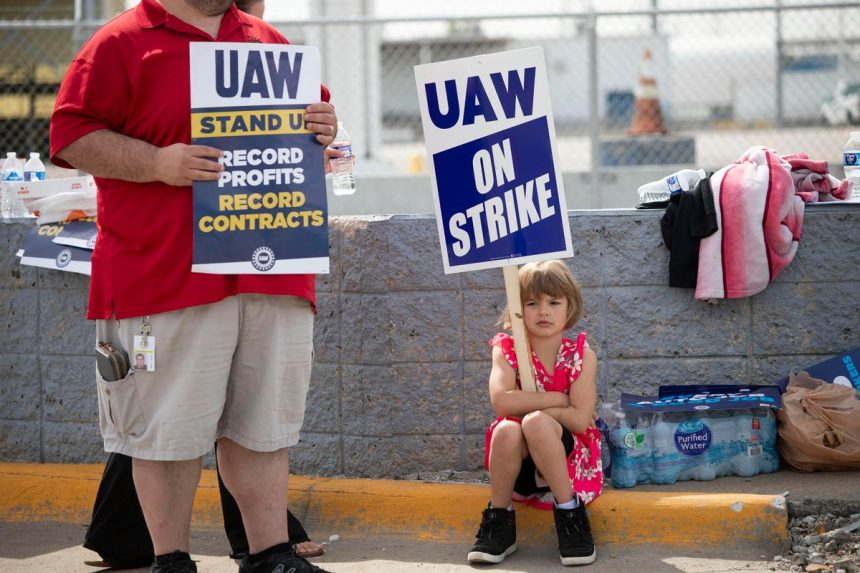It is 4:45 a.m. on Tuesday, and Marcelina Pedraza is on her way to work at the Ford Chicago Assembly Plant. With just a 10-minute daily commute, she is one of the lucky Ford plant employees who does not have to traverse Chicago’s sprawling highways to make it to the plant on Torrence Avenue where the Ford Explorer, Lincoln Aviator, and the Ford Interceptor, the police cruiser model, are produced.
Pedraza’s plant, in the Hegewisch neighborhood on the southern tip of Chicago’s city limits, has not been asked to hit the strike lines yet. However, as the union known as United Auto Workers (UAW) enters its first week in a historic strike against Ford, General Motors (GM) and Stellantis that call can come at any time.
This is a collective action that Pedraza voted for and believes is a necessary next step for her and her co-workers.
“I don’t want to strike, but I will,” said Pedraza, an electrician for Ford. “In the short run, we will lose money, but this is the only thing we have. Our labor is the only thing to make these companies listen.”
Pedraza, part of the “Stand-Up Strike,” counted among the 97 percent of UAW members who voted to strike for better wages, defined pension benefits, retiree healthcare and ending the wage tier system.
Unlike previous UAW strikes, this strike involves taking plants offline one by one in a staggered manner to increase pressure on the automakers. This unprecedented strike also comes on the heels of a strike threat at UPS and a prolonged labor-management battle between the Hollywood studios, SAG-AFTRA, and the Writers Guild.
To truly understand what makes this strike different from those of previous generations, one must look at the paystubs of plant workers over the past decade.
Pedraza became a UAW member in January 2013. At the start of her journey in the automotive industry, she worked at a Chrysler plant 80 miles from her current home. Back then, she made roughly $33 an hour. Today, she makes 36.96 an hour.
That means over ten years, Pedraza has only seen a 10 percent increase in her salary, which she labels as unfair.
“For years, our wages have been stagnant while the cost of living gets higher, and inflation has only worsened these problems,” Pedraza exclaimed.
The UAW has asked automakers for a contract that secures a 36% pay increase over the course of four years. Ford has instead offered a 9% general wage increase over the contract’s lifespan, $12,000 in cost-of-living adjustment bonuses throughout the contract and 6% lump sum awards to full-time employees, according to a statement from the company.
Pedraza believes that the initial offer undermines and undervalues the hard work she and her colleagues have done.
“It’s time for the companies to give back a lot of what they’ve taken over these last few contracts,” Pedraza said. “The workers have been giving concessions to help the automakers since the 2009 recession when the company said ‘look we need help, you’re gonna have to give some so we can stay afloat.’”
According to UAW, the Big Three — GM, Ford Motor Company, and Stellantis North America — have closed 65 manufacturing plants over the last 20 years.
Over just the past three years, Ford has seen increases in annual revenue surpass that of wages. In 2020,annual wages increased by 7.23 percent. By 2022 however, the company witnessed a 15.93 percent increase in revenue.
In June, year-to-date figures showed a nearly 14.72% revenue increase.
What makes this wage conversation worse for striking UAW Ford members is the total compensation package afforded to Ford president and CEO Jim Farley.
The Detroit Free Press reported that, by 2022, the Dearborn-based CEO was pulling in a whopping $20,996,146. That made his salary at least 281 times higher than that of Pedraza and her fellow union members.
Pedraza quickly pointed out that her current salary almost makes it impossible to afford a brand-new Ford automobile. She currently depends on her 2013 Jeep to take her to and from work.
More than 140,000 miles ago, Pedraza purchased that Jeep through an employee discount program that some dealerships no longer honor.
“Most of us can’t even afford the products we make,” she noted. “I was fortunate enough to buy two new cars in my lifetime. The last one was ten years ago. And right now, I am so glad that I trusted the Jeep made at a Toledo plant by my union sibling.”
The contract campaign and Stand Up Strike have also focused on workplace safety.
During the pandemic, automotive factory workers were deemed essential. The federal government compelled Ford and GM to manufacture items in short supply that would aid the U.S.’s response to the deadly coronavirus.
UAW workers were on the frontlines. Working in factories at the height of the pandemic under heartbreaking conditions.
“We came to work not knowing what was going to happen,” Pedraza said.
“A lot of folks got sick. Some people died,” she added. “I have heard a couple of people I know that are immunocompromised; one had diabetes, he got COVID. And he passed away. And because we were operating under the 2009 contract, we did not get hazard pay.”
Long after COVID-19’s worst days, Pedraza and her 12-year-old daughter continue to see the harms front and center. During the pandemic, Pedraza had to come out of pocket for full-time child care while her daughter engaged in remote learning. She equates the monthly fee to a mortgage.
As part of their bold demands to the Big Three, the UAW wants the companies to restore defined benefit pensions from previous contracts and pay all healthcare-related expenditures for retirees.
A couple of months ago, Pedraza, a member of UAW’s Unite All Workers for Democracy caucus, voted for Sean Fain with the hope that he would unite the union and advance an agenda that prioritizes the environment and needs of working families.
“At first, folks were divided and scared during our union elections,” Pedraza noted.”Now, we want to be on the picket line. We want to fight for better benefits and better wages.”
As a result of new joint ventures between the Big Three Automakers and various start-up firms, electric vehicle opportunities could potentially go to “Right-to-Work” states or plants that are partially owned by one of the Big Three.
This arrangement places UAW workers outside of the collective bargaining agreement.
“These joint ventures, while they don’t have to be union, should be union.” Pedraza declared. “The workers there make parts and automobiles; it is hard work, it’s dangerous work and those workers deserve the projection of a collective bargaining agreement.”
With a father and grandfather who worked in Chicago’s steel mills, Pedraza has had a front-row seat to the plethora of environmental harms plaguing some of America’s largest manufacturing towns. That’s why she’s on the frontline fighting for a “cleaner neighborhood, for cleaner air, land and water” as a member of Chicago’s Southeast Environmental Task Force.
In that capacity, Pedraza has her sights set on the country’s transition to electric vehicles. She wants her union, UAW, to be at the forefront of that pivot.
A transitional measure that UAW is championing extends collective bargaining to workers at more than ten electric vehicle battery factories. This is part of joint ventures between U.S. automakers and South Korean battery makers.
The union is also demanding the right to strike over plant closing.
For the transition to electric vehicles to be environmentally and economically equitable, Pedraza believes neighborhoods like hers on the eastside of Chicago, just blocks away from the Ford plant, must be centered in contract negotiations and policy.
“We deserve good jobs, but not at the expense of our health,” she said. “Environmental justice is workers’ justice. A healthy environment will make healthy workers and create a healthy economy.”
Read the full article here









